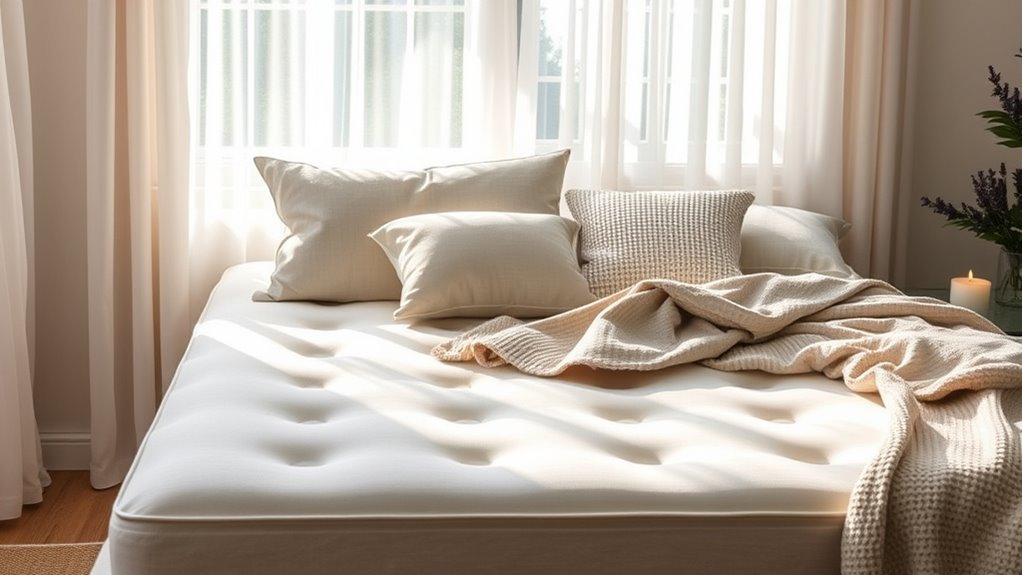When choosing a mattress for stomach sleepers with fibromyalgia, focus on firm support to maintain spinal alignment and prevent discomfort. Look for materials like latex or hybrid models that offer both support and pressure relief. Consider features like motion isolation and breathable fabrics to enhance your sleep experience. Don’t forget to check trial periods and return policies to guarantee you can find the right fit. There are more tips that can help you achieve better rest and manage symptoms effectively.
Understanding Fibromyalgia and Its Impact on Sleep

If you’re one of the millions living with fibromyalgia, you know how much it can disrupt your sleep. Chronic pain often leads to restless nights, making it tough to achieve deep, restorative sleep. Research shows that fibromyalgia can cause various sleep disruptions, including difficulty falling asleep, frequent awakenings, and non-refreshing sleep. This can create a vicious cycle, as inadequate rest may worsen your pain levels, impacting your daily life. You might feel trapped in a cycle of fatigue and discomfort, longing for freedom from these limitations. Understanding this connection is essential for managing your condition. By recognizing how fibromyalgia affects your sleep, you can take proactive steps to improve your sleep environment and overall well-being, paving the way for a more restful night.
Importance of Mattress Support for Stomach Sleepers

Choosing the right mattress is essential for stomach sleepers, as improper support can lead to discomfort and pain. For those with fibromyalgia, finding a mattress that promotes spinal alignment is vital. When you sleep on your stomach, your spine needs to maintain a neutral position. A supportive mattress helps prevent your hips from sinking too deeply, which can create misalignment and exacerbate pain. Additionally, consider mattress durability; a long-lasting mattress can provide consistent support over time, reducing the risk of sagging. Investing in a quality mattress not only enhances your sleep quality but also contributes to overall well-being. By prioritizing support and alignment, you can enjoy a more restful night’s sleep, allowing you the freedom to wake up refreshed.
Key Features to Look for in a Mattress

When selecting a mattress, it’s important to focus on specific features that cater to stomach sleepers‘ unique needs. Look for a mattress construction that offers firm support, as this helps maintain proper spinal alignment and prevents discomfort. A medium-firm bed often works best, balancing comfort and support for your sleep position. Additionally, consider materials that enhance breathability, like latex or gel-infused foam, which can help regulate temperature during the night. Edge support is another key feature, ensuring you feel secure when sitting or getting in and out of bed. Finally, check for motion isolation, as this can minimize disturbances from a partner’s movements, allowing you to enjoy restorative sleep despite fibromyalgia symptoms.
Mattress Types: Pros and Cons for Stomach Sleepers
While there are various mattress types available, understanding their pros and cons can help stomach sleepers make an informed decision. Memory foam mattresses conform to your body but can cause excessive sinking, which may strain your neck and spine. Latex mattresses offer bounce and support, helping maintain proper alignment, but they can be too firm for some. Innerspring options provide good airflow and support but may not contour well to your body, risking discomfort. Hybrid mattresses combine materials, offering a balance of support and comfort, which might be ideal for stomach sleepers. Ultimately, considering mattress materials and how they interact with your sleep positions is essential for finding a bed that promotes restful sleep without pain.
Firmness Levels: Finding the Right Balance
When you’re a stomach sleeper, finding the right mattress firmness is essential for your comfort and spinal alignment. Understanding firmness ratings can help you identify the ideal level that supports your body without causing strain. It’s also important to know that you can adjust your mattress firmness to guarantee a restful night’s sleep tailored to your needs.
Understanding Firmness Ratings
Choosing the right firmness level for your mattress can greatly impact your sleep quality, especially if you’re a stomach sleeper. Firmness ratings, typically ranging from soft to extra firm, reflect how supportive the mattress will feel based on your sleep position. Stomach sleepers often benefit from a firmer surface to prevent the spine from sinking too deeply, which can lead to discomfort. Understanding mattress construction is essential, as materials like memory foam and latex can influence firmness perception. A mattress that’s too soft may cause misalignment, while one that’s too firm could create pressure points. By evaluating firmness ratings alongside your unique needs, you’ll find a mattress that supports restful sleep and enhances your overall well-being.
Ideal Firmness for Stomach Sleepers
Finding the ideal firmness for stomach sleepers is essential for ensuring a restful night’s sleep. A mattress that’s too soft can lead to misalignment, while one that’s too firm can create pressure points. Here are three key factors to evaluate:
- Mattress Thickness: A thickness of 10-12 inches generally offers the right support for stomach sleepers.
- Support Layers: Look for a mattress with high-quality support layers that maintain spinal alignment and reduce sinking.
- Personal Preference: Everyone’s comfort level varies, so test different firmness options to find what feels best for you.
Adjusting Firmness for Comfort
For stomach sleepers, achieving the right balance of firmness can make all the difference in comfort and support. It’s essential to take into account your sleep position and how it impacts your body. A mattress that’s too soft may cause your hips to sink, leading to misalignment and increased pressure on your spine. Conversely, a mattress that’s too firm can be uncomfortable and restrict your movement.
Adjusting firmness is key; look for options that allow you to fine-tune the feel. Medium-firm mattresses often strike the right balance, providing support while alleviating pressure points. Remember, the goal is to promote healthy spinal alignment and enhance your overall sleep quality, so take your time in finding what feels best for you.
Materials That Alleviate Pressure Points
Since stomach sleepers often face unique challenges, selecting the right materials for your mattress can make a notable difference in alleviating pressure points. Here are three materials you should consider:
- Memory Foam: This material contours to your body, providing exceptional pressure relief while supporting proper spinal alignment.
- Latex: Naturally resilient, latex offers both comfort and support, helping to distribute your weight evenly and reducing pressure build-up.
- Hybrid Models: Combining innerspring support with memory foam or latex layers, hybrids can provide the best of both worlds, ensuring you receive the necessary support without sacrificing comfort.
Choosing these materials can notably enhance your sleep quality, allowing you to wake up feeling refreshed and free from discomfort.
Trial Periods and Return Policies: Why They Matter
When you’re choosing a mattress, trial periods and return policies are essential for your peace of mind. They give you the chance to really test how well the mattress supports your stomach-sleeping posture and comfort needs. Understanding these policies can help you make a more informed decision, ensuring you find the right fit for a good night’s sleep.
Importance of Trial Periods
While selecting the right mattress can feel overwhelming, understanding the importance of trial periods can greatly ease your decision-making process. Here are some trial period benefits to examine:
- Comfort Assessment: It allows you to truly test how the mattress feels over time, especially for stomach sleeping.
- Pain Relief: You can evaluate if the mattress alleviates discomfort associated with fibromyalgia, ensuring better sleep quality.
- Flexible Return Options: If it doesn’t meet your needs, a flexible return policy can save you from a poor investment.
Understanding Return Policies
Understanding return policies is vital, especially for stomach sleepers who need to confirm their mattress supports their unique sleeping habits. You’ll want to pay attention to return policy considerations, as they can greatly affect your overall satisfaction. A flexible trial period allows you to properly assess the mattress’s comfort and support, important for managing fibromyalgia symptoms. Look for brands that offer mattress exchange options, giving you the freedom to switch if your first choice doesn’t meet your needs. Remember, a good return policy guarantees you can make a risk-free investment in your sleep health, ultimately helping you find a mattress that truly enhances your well-being. Prioritize your comfort and confirm your choice aligns with your specific sleeping style.
Tips for Maintaining a Healthy Sleep Environment
Creating a healthy sleep environment is essential for enhancing your overall sleep quality, especially if you’re a stomach sleeper. To optimize your sleeping environment, consider these key factors:
- Noise Reduction: Use white noise machines or earplugs to minimize disruptive sounds, ensuring a peaceful night’s rest.
- Light Control: Invest in blackout curtains or eye masks to block out light, which can interrupt your sleep cycle and keep you alert.
- Temperature Regulation: Aim for a cool room temperature, ideally between 60-67°F, to promote restful sleep and reduce discomfort.
Frequently Asked Questions
Can a Mattress Affect Fibromyalgia Pain Levels?
Absolutely, a mattress can greatly impact your fibromyalgia pain levels. Imagine sinking into a cloud that cradles your body just right, alleviating pressure on tender spots. The right mattress firmness can enhance your sleep quality, allowing you to wake up refreshed instead of achy. If it’s too soft or firm, it may exacerbate your discomfort, disrupting your precious rest and leaving you feeling drained. Choosing wisely can lead to a more comfortable, pain-free night.
How Often Should I Replace My Mattress?
You should replace your mattress every 7 to 10 years, depending on its lifespan and your comfort needs. If you notice sagging, lumps, or persistent discomfort, it’s a sign for replacement. Regularly assess how well you’re sleeping; if you’re waking up in pain or feeling unrested, it may be time for a change. Prioritizing your sleep can lead to better overall health and freedom from discomfort, so don’t hesitate to invest in your well-being.
Are Adjustable Beds Beneficial for Stomach Sleepers?
Are adjustable beds the secret to stomach sleeper comfort? Well, if you’ve ever tried to find a comfy position without resembling a pretzel, you know the struggle. Adjustable beds can be beneficial! They let you elevate your head or legs, reducing pressure on your spine and easing discomfort. Plus, you can customize your position for that oh-so-necessary freedom. Embrace the adjustable bed benefits and say goodbye to restless nights of battling your mattress!
What Bedding Materials Help Reduce Discomfort?
When it comes to reducing discomfort, consider bedding materials like memory foam and latex support. Memory foam contours to your body, alleviating pressure points, while latex provides a responsive feel that keeps you supported. Both materials can help create a more comfortable sleeping environment, giving you the freedom to rest better. It’s essential to choose options that cater to your specific needs, so you can wake up refreshed and ready to take on the day.
How Do I Know if My Mattress Is Too Firm?
They say, “you can’t have your cake and eat it too,” and that rings true for mattress firmness. If you’re waking up with discomfort, feeling pressure points, or noticing changes in your sleep alignment, your mattress might be too firm. You should sink slightly into the mattress for proper support. Listen to your body; if you’re consistently restless or in pain, it’s time to reconsider your mattress choice for better comfort.



